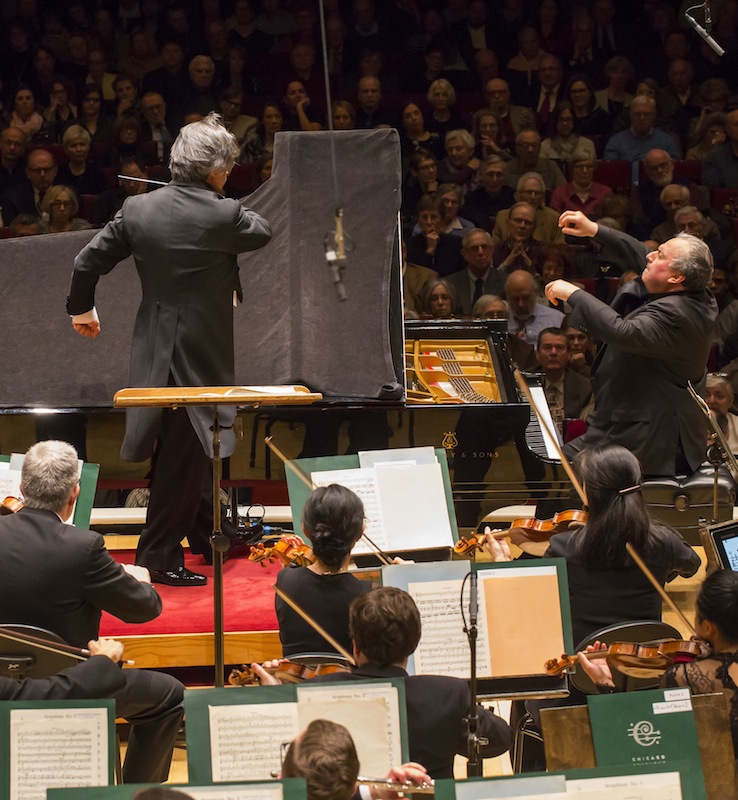Muti and CSO are back and in peak form with Rossini, Mendelssohn

Following what was by all accounts a highly successful European tour last month, Riccardo Muti returned to town Thursday night for his first local concerts with the Chicago Symphony Orchestra since October.
The program of Rossini, Beethoven and Mendelssohn may have lacked something in imagination but with Muti and the orchestra in peak form it more than made up the balance in polish and execution with an able assist from a popular guest soloist.
The concert opened with Rossini’s Overture to Semiramide. Among the composer’s finest opera curtain-raisers, the overture hasn’t been played by the CSO downtown in nearly three decades.
Muti is nearly without peer in music of his compatriots, as shown in the seminar delivered with Thursday night’s performance. From the stately glowing horns in the opening section, Muti led an agile, scrupulously balanced reading that brought out every curveball of Rossini’s music delightfully, the dynamic drops, sudden rests, and crescendoes registering with consummate wit and style. There was superbly characterful playing across all sections with Stephen Williamson’s burbling clarinet especially winning.
The CSO’s season-long exploration of the complete Beethoven piano concertos continues this week with Yefim Bronfman as solo protagonist in the Concerto No. 4.
It was good to hear Bronfman in something other than his signature piece of the Brahms Second Piano Concerto or one of the Russian keyboard blockbusters. Indeed, it reminded one of his versatility and that there is more to Bronfman’s artistry than massive power and dazzling technique.
Throughout Beethoven’s opening movement, the pianist was just as convincing in this light-textured music, his poised, supple touch always falling graciously on the ear. He was spirited in his give and take with Muti’s light-footed accompaniment, and built the large cadenza into an imposing solo moment while carefully integrating it within the music framing it.
Bronfman’s prayer-like statements in the slow movement were aptly inward, soothing the orchestra’s gruff string statements into a becalmed state. While the off-the-beat main theme of the finale was duly energized with rapid-fire exchanges between soloist and orchestra, Beethoven’s antic humor was largely missing in action, with a rather straight-faced traversal of one of the composer’s most joyous concerto closers.
Music of Mendelssohn has not figured greatly in Muti’s Chicago tenure with the “Italian” symphony the composer’s only work in the genre programmed here to date.
Until Thursday night that is, when Muti led the orchestra in Mendelssohn’s “Reformation.” The most Lutheran symphony ever written, Mendelssohn’s Fifth exults with its interpolated quotations of the Dresden Amen—later mined extensively by Wagner in Parsifal— as well as the celebrated hymn “Ein feste Burg ist unser Gott” (A mighty fortress is our God).
Despite its published designation as No. 5, the “Reformation” was only Mendelssohn’s second symphony to be written, and the first movement has some uncharacteristically clunky moments. Muti is at his best when finessing a work’s rough edges and he dexterously handled the transitions while drawing an array of detailing and imbuing the Dresden Amen with apt spiritual glow. Highlighted by Stefan Ragnar Hoskuldsson’s avian flute solos, Muti and the orchestra put across the galumphing charm of the second movement in fine style.
The Andante serves as a brief introduction to the finale, and with Muti’s finely graded dynamics the strings conveyed the searching contemplation of the music. Hoskuldsson’s eloquent statement of “Ein feste Burg” led into the finale, which went with admirable exuberance, building surely to a final majestic statement of the hymn.
The program will be repeated 1:30 p.m. Friday and 8 p.m. Saturday. cso.org; 312-294-3000.
CSO Notes
*It’s official. Christopher Martin will not be returning to the CSO and will remain as principal trumpet of the New York Philharmonic. Martin, principal of the CSO for 11 years, was on leave to perform in New York this season and has elected to stay with the Philharmonic.
The CSO will be holding auditions for principal trumpet in June.
*Mary Sauer will receive the Theodore Thomas medallion at Saturday’s CSO concert. Sauer retired from the orchestra last November after 57 years as pianist with the orchestra.
A CSO spokeswoman said the job of pianist has been eliminated as a full-time orchestra position and the CSO will book pianists as needed for its subscription concerts.
Posted in Performances

